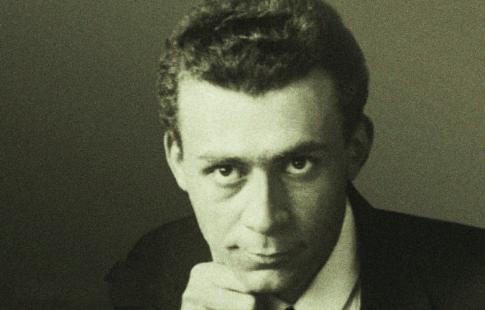Lucian Blaga (1895-1961)

I feel the peace dropping with your leaves in my soul - and, silenced...
The Oak
Clear, distant, from
the breast of a tower
I can hear a bell's heartbeat,
and in its sweet echoes
it seems that my veins flow
with drops of silence.
Oak tree at the forest's edge
why does this soft winged peace
overcome me, defeat me
when I lie in your shadow
while you caress me
with your playful leaves?
Oh, who can tell
Perhaps the time will soon come
when from your trunk
they will make my coffin
and I am feeling now the peace
I will taste between its boards:
I feel the peace dropping with your leaves
in my soul - and, silenced
with each passing moment
I listen to the sound of my coffin
steadily growing in your trunk,
oak at the forest's edge.
Silence
Such a deep silence surrounds me, that I think I hear
moonbeams striking on the windows.
In my chest,
a strange voice is awakens
and a song plays inside me
a longing that is not mine.
They say that ancestors, dead before their time,
with young blood still in their veins,
with great passion in their blood,
with the sun still burning in their blood
come,
come to continue to live
within us
their unfinished lives.
Such a deep silence surrounds me, that I think I hear
moonbeams striking on the windows.
O, who knows, soul of mine, in which chest you will sing
you also, after centuries,
in soft ropes of silence,
on harps of obscurity - the drowned longing
and the pleasure of living torn? Who knows?
Who knows?
We And The Earth
So many Stars fall tonight.
The evil of the night holds the Earth between his hands
and blows balls of flames upon the Earth,
forcefully, burning it.
Tonight, when so many
stars fall, your young witch
body burns in my arms
as if it was between ardent flames.
In madness,
I extend my arms like a flare,
to melt the snow from your naked shoulders
and to drink, consume with hunger,
your strength, blood, pride, your spring, everything.
At the dawn, as the day illuminates the night,
when the ashes of the night are gone, taken
by the wind to the west;
at the dawn, we also wish to be
just ashes, ourselves- the Earth.
* * *
Lucian Blaga (May 9, 1895 - May 6, 1961) The ninth son of a parish priest, Blaga grew to become one of Romania's foremost poets and philosophers. Born in Transylvania, his father died in 1908 leaving the family destitute and forcing Blaga to leave secondary school. Until the age of four, though he could talk, he purportedly never uttered a word; a period of his childhood that he later described as, "under the sign of the incredible absence of word."
Blaga's first poems were published in 1910, followed four years later by his first philosophical article, "Notes on intuition in Bergson." Around this time he traveled to Italy, where he scoured libraries for books on philosophy.
At the outset of the first World War, Blaga began theological studies at Sibiu, graduating in 1917. In 1919 his first volume of poetry, Poemele Luminii (Poems of Light) was published. The following year, to avoid serving in the Austro-Hungarian army, he began taking theology courses at the Siblu Orthodox Seminary, the moving to Vienna to study philosophy at the University of Vienna where his thesis titled, "Culture and Cognition" earned him his PhD in 1920. At this time Blaga married and became press attaché to the Romanian legation in Warsaw and later transfered to Vienna. In 1938 he transfers to Bucharest and then Lisbon. That same year he returned to Romania, is made Professor of Philosophy of Culture at the University of Cluj. Beginning in 1943 Blaga became editor of the annual, Saeculum.
Dismissed by the Communist regime from his university professor chair in 1948, Blaga worked as librarian for a branch of the History Institute of the Romanian Academy, where until 1960 he was only allowed to publish translations. In 1956 Blaga was nominated for the Nobel Prize. He was considered the favorite to win the award until the communist government in Bucharest sent emissaries to Sweden to protest Blaga's nomination.
In 1961 Lucian Blaga died of cancer and was buried at Lâncrâm, Romania. The following years saw his works begin to be published again, some edited by his daughter.




 del.icio.us
del.icio.us Digg
Digg

Post your comment